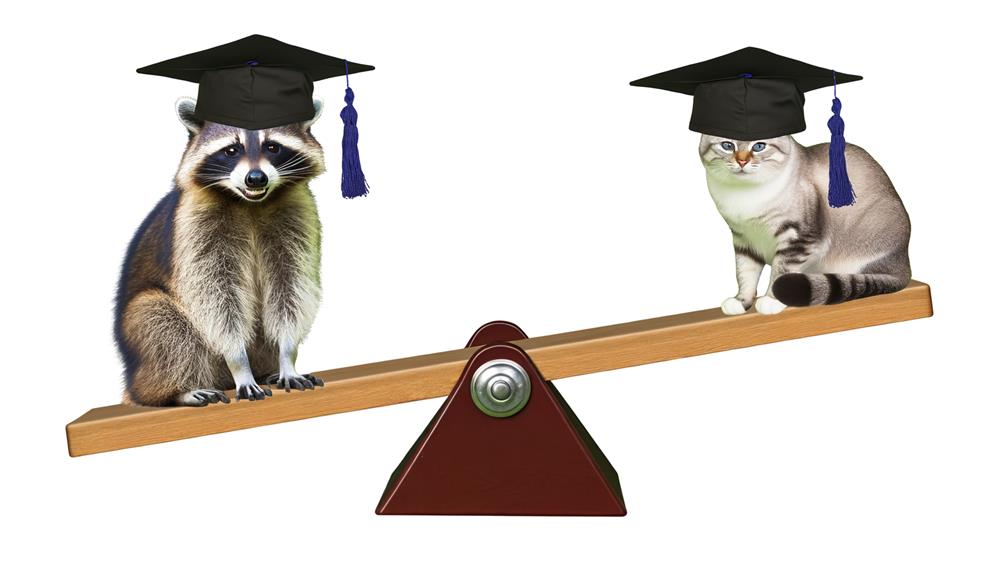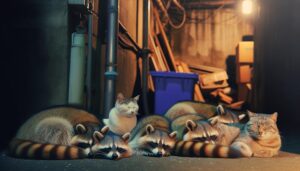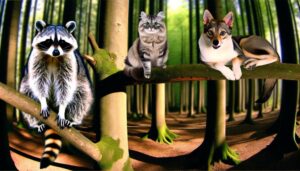Raccoons: 10 Reasons They Might Be Smarter Than Cats
Raccoons exhibit high problem-solving abilities and long-term memory, often outperforming cats in empirical studies such as maze and puzzle tasks. On the other hand, cats demonstrate an exceptional sense of hearing, smell, night vision, agility, and stalking prowess, intelligence facets tailored for their solitary and predatory lifestyle.
Both animals possess different forms of intelligence reflective of their individual ecological niches and lifestyles. To gain a deeper understanding of the cognitive intricacies that differentiate the intelligence of raccoons and cats, further scrutiny of the matter is recommended.

Key Takeaways
- Raccoons display higher problem-solving abilities and long-term memory recall than cats in scientific tests.
- Cats excel in agility, stealth, and hunting due to their unique cognitive processes and lifestyle.
- Raccoons show more complex behaviors, such as tool use, which is indicative of higher cognitive abilities.
- Both animals are adaptable and intelligent in their own ways, reflecting their unique ecological niches.
- While raccoons outperform cats in certain cognitive tasks, intelligence is not uniformly defined and depends on various factors.
Defining Animal Intelligence
To adequately understand the intellectual capacities of raccoons and cats, it is important to first establish a clear and thorough definition of animal intelligence. Intelligence in animals is typically gauged through criteria such as problem-solving ability, learning speed, and adaptability to new environments. It encompasses the capacity to use tools, communicate, and exhibit social behavior.
Animal intelligence also involves memory, especially the ability to recall and apply past experiences to present situations. However, it is essential to note that intelligence varies widely among species and even among individuals within the same species. Understanding these nuances will empower us to make informed comparisons and respect the diverse cognitive abilities present in the animal kingdom.
Grasping Feline Cognition
To accurately compare the intelligence of raccoons and cats, we must first comprehend the cognitive capabilities of felines.
This primarily encompasses two critical aspects: understanding cat intelligence and examining feline problem-solving skills.
Understanding Cat Intelligence
Delving into the world of feline thinking, it becomes clear that cats exhibit a unique form of intelligence characterized by their problem-solving abilities, flexibility, and sensory perception. Their cognitive processes, although distinct from humans, enable them to interact with their surroundings in ways that ensure their survival.
Cats are noted for their exceptional sensory perception, particularly in the domains of hearing, smell, and night vision, which all contribute to their skilled hunting abilities. Their adaptability is also a reflection of their intelligence, as they can thrive in various settings, from bustling cities to remote woods.
However, a thorough understanding of cat intelligence requires a detailed examination of these abilities and how they manifest in different situations, a pursuit that continues to captivate scientists and cat enthusiasts alike.
Feline Problem-Solving Skills
One of the most remarkable aspects of feline intelligence is their ability to solve problems, a demonstration of their cognitive prowess. Cats exhibit unique problem-solving skills, often applying strategies that are not merely instinctual, but show evidence of higher-level thinking.
| Cognitive Aspect | Feline Response | Example |
|---|---|---|
| Pattern Recognition | Cats can identify patterns & adapt behavior | Altering hunting strategy based on prey habits |
| Cause & Effect | Cats understand actions have consequences | Knocking objects to get human attention |
| Object Permanence | Cats know objects exist even when hidden | Searching for hidden toys or food |
These abilities indicate an advanced cognitive complexity, suggesting that the intelligence of cats might be underestimated. The question remains, however, how these skills compare to those exhibited by raccoons, another animal famed for its problem-solving abilities.
Exploring Raccoon Intelligence
Examining the intelligence of raccoons, researchers have found compelling evidence of their cognitive capabilities that rival, and in some cases, exceed those of domestic cats. Raccoons demonstrate an impressive breadth of skills that emphasize their adaptability and problem-solving prowess.
- Tool Use: Raccoons have been observed utilizing tools in their environment, a trait typically associated with higher intelligence.
- Memory: Studies suggest raccoons have an excellent long-term memory, being able to remember solutions to tasks up to three years later.
- Problem-Solving: They have demonstrated complex problem-solving abilities, often devising creative strategies to access food or escape confinement.
These findings underline the raccoon's cognitive potential, and while direct comparisons with cats should be approached with caution, it is clear that raccoons possess a level of intelligence that demands respect.
Raccoons Vs Cats: a Comparison
In a comparative analysis between raccoons and cats, it is essential to take into account certain key aspects of their cognitive abilities, behavior patterns, and adaptive skills.
Raccoons, being omnivores, exhibit a broader range of behaviors for food procurement compared to carnivorous cats. This versatility may indicate a higher level of problem-solving ability. Additionally, their dexterity in manipulating objects surpasses that of cats.
However, cats display greater speed, agility, and stealth – traits beneficial in hunting and evasion. Both animals are solitary yet can thrive in communities, showcasing their adaptability.
Hence, while it might be tempting to rank one over the other, the intelligence of raccoons and cats is distinct, reflecting their unique ecological niches.
The Scientific Perspective
From a scientific perspective, measuring the cognitive abilities and comparing intelligence testing results of raccoons and cats can shed light on their relative intelligence. Both species have been subjected to various experiments designed to test their problem-solving skills and memory retention.
Cognitive Abilities Comparison
Scientific studies on the cognitive abilities of raccoons and cats reveal intriguing insights into their intelligence levels.
Raccoons, being nocturnal creatures, exhibit a complex level of problem-solving skills. The dexterity and tactility of their paws allow them to open closed containers and manipulate complex mechanisms.
Cats, on the other hand, demonstrate superior hunting skills, showcasing a high level of spatial awareness and agility.
From a broader perspective, the following factors are essential in this comparison:
- The environment in which the animal lives and its adaptability to changes
- The creature's ability to learn from experiences and apply that knowledge
- The animal's capacity to solve problems and overcome challenges
Intelligence Testing Results
Turning our attention to empirical studies, the results from intelligence testing offer a more definitive comparison between the cognitive abilities of raccoons and cats. Studies indicate that raccoons possess superior problem-solving abilities and memory recall, often outperforming cats in maze and puzzle tasks. Raccoons are known to display complex behaviors such as opening doors, remembering solutions to tasks for up to three years, and using tools to acquire food – a skill often associated with higher cognitive functioning.
Conversely, while cats show remarkable instincts and agility, they typically perform less effectively in problem-solving tests. However, this doesn't imply cats are less intelligent, but rather their intelligence manifests differently, often adapted towards their solitary and predatory lifestyle.
Rethinking Animal Smartness
Often, we assess animal intelligence based on our own human-centric viewpoints, but it is crucial to reassess this approach in order to gain a more accurate understanding of animal cleverness. It's time we shift our perspective and redefine what we view as 'intelligence'.
To start, we should acknowledge that different species have different cognitive strengths, largely influenced by their ecological needs and evolutionary history.
Next, we need to recognize that some forms of intelligence may not be quantifiable by human standards.
Conclusion
Ultimately, the notion of intelligence in animals is complex and multifaceted.
While both raccoons and cats exhibit remarkable cognitive abilities, discerning which species is 'smarter' is contingent upon the particular set of skills being assessed.
Is it fair to compare the dexterity of raccoons with the hunting prowess of cats?
Ultimately, the discourse on animal intelligence demands a rethinking of the parameters used to measure their cognitive capacities.






